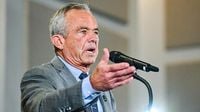On a sweltering Wednesday afternoon in Austin, Texas, the ornate Governor’s Public Reception Room at the Texas Capitol buzzed with anticipation. With the state’s political heavyweights assembled—Governor Greg Abbott, Health and Human Services Secretary Robert F. Kennedy Jr., Lieutenant Governor Dan Patrick, Speaker Dustin Burrows, and a host of senators and representatives—the stage was set for what many are calling a watershed moment for public health in Texas.
Governor Abbott, flanked by Secretary Kennedy and an array of bipartisan lawmakers, signed a suite of new “Make America Healthy Again” (MAHA) laws on August 27, 2025. The event, streamed live from 1100 Congress Avenue, drew both local and national attention, as these laws are poised to dramatically reshape the landscape of nutrition and health policy in Texas—and perhaps, in time, across the United States.
“This puts Texas ahead of the nation in leadership,” Kennedy declared, standing before an eager crowd of officials and reporters. “Texas has chosen a bold new course for public health — one I urge other states to follow.” According to Nexstar Media, the MAHA initiative was a cornerstone of Kennedy’s campaign for president just last year, and it was instrumental in his appointment as the nation’s top health official under President Trump’s administration.
The newly signed MAHA laws, officially set to take effect on Monday, September 1, 2025, introduce a range of sweeping changes. First and foremost, they prohibit the use of federal food assistance funds for the purchase of sodas and candy—a move that, supporters argue, targets two of the most significant contributors to childhood obesity and chronic disease. For families relying on these benefits, the grocery list will look different in just a matter of days.
But that’s not all. The legislation also bans certain additives in free and reduced-priced school meals, aiming to eliminate substances that have been linked to negative health outcomes in children. Food manufacturers, too, are facing new requirements: stricter labeling rules will soon force companies to provide clearer, more transparent information about what goes into their products. “Every legislator in Texas wants to see Texas on a pathway to be healthier,” Abbott said at the signing. “These laws chart that pathway.”
Abbott didn’t mince words about the state’s priorities. “Taxpayer dollars will no longer be used to fund chronic health problems in our state,” he stated, underscoring the fiscal as well as the moral impetus behind the reforms. The governor’s remarks echoed a broader sentiment among Texas lawmakers: that public funds should be used to promote well-being, not subsidize unhealthy choices that can lead to lifelong medical issues.
The journey to this moment wasn’t without its political hurdles. According to Nexstar Media, the MAHA package managed to win bipartisan support in the regular legislative session earlier in 2025—a rare feat in the often fractious Texas Legislature. The spirit of cooperation was all the more notable given the subsequent redistricting battles that have only deepened partisan divides in the state. Yet, on this issue, lawmakers from both sides of the aisle found common ground, united by a shared concern for the health of Texas children and families.
The roots of the MAHA movement run deep. Kennedy’s advocacy for healthier food policies was a central theme of his presidential campaign, and it has continued to shape his tenure as Health and Human Services Secretary. In May, the much-anticipated MAHA Commission report on children’s health was released, highlighting the dangers posed by ultraprocessed foods, environmental chemicals, digital behavior, and what Kennedy described as “overmedicalization.” The report’s findings resonated with many parents and health professionals, who have long sounded the alarm about rising rates of chronic illness among America’s youth.
“I told President Trump we are going to end the chronic disease problem, but we can’t do it from Washington,” Kennedy said at the Capitol event. “It’s initiatives like this — vision and courage of people in this room to stand up to these industries and all the lobbyists who are flooding in and actually do something great for Texas.” His words drew applause from the assembled lawmakers, many of whom had weathered intense lobbying from the food and beverage industries during the legislative process.
The laws themselves reflect a mix of practical policy and symbolic action. By restricting the use of federal food assistance for sugary drinks and candy, Texas is taking a direct shot at products that have been linked to diabetes, obesity, and other chronic diseases. The new bans on certain additives in school meals address concerns that children from low-income families are disproportionately exposed to ingredients that may harm their health. And with tougher labeling requirements, consumers will have more tools to make informed choices at the supermarket.
Supporters of the MAHA laws argue that these changes are long overdue. Decades of rising rates of childhood obesity and chronic illness have prompted calls for more aggressive action at every level of government. According to the MAHA Commission report, ultraprocessed foods and environmental chemicals are among the primary drivers of these health challenges, and the new Texas laws represent a concrete step toward addressing them.
Yet the reforms have not been without critics. Some industry groups have raised concerns about the potential economic impact of the new restrictions, warning that food manufacturers and retailers may face higher compliance costs. Others question whether the bans on certain additives and the prohibition of soda and candy purchases with federal assistance will have the intended effect, or simply push families toward other unhealthy options. But for now, the prevailing sentiment among Texas officials is one of optimism and resolve.
“Not only making Texas healthy again, making America healthy again,” Kennedy added at the event—a rallying cry that seemed to capture the mood in the room. The hope, among both lawmakers and public health advocates, is that Texas’s example will inspire other states to adopt similar measures, creating a ripple effect that could transform American diets and health outcomes for generations to come.
As the laws go into effect, all eyes will be on Texas to see whether this bold experiment in public health policy delivers on its promise. For families, schools, and food companies alike, the coming months will bring change—and, perhaps, the beginnings of a healthier future.




